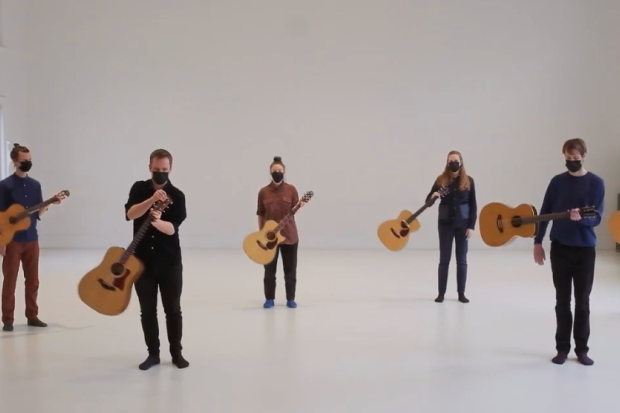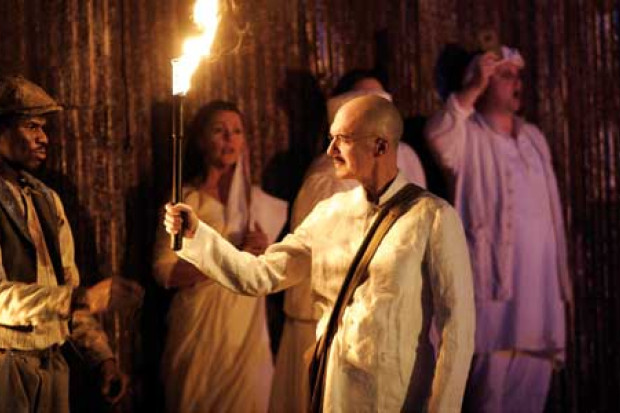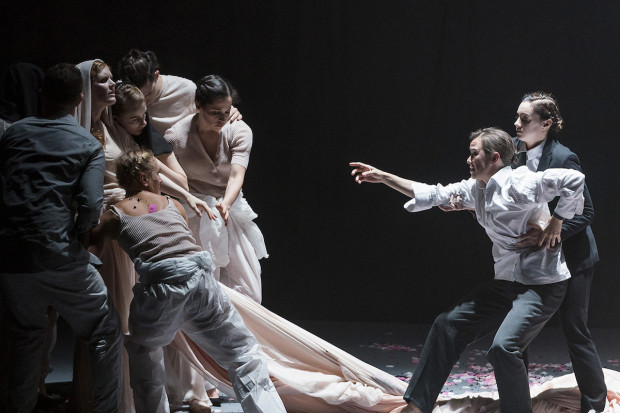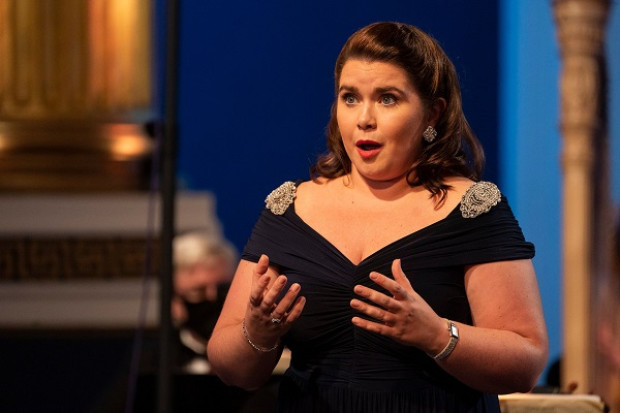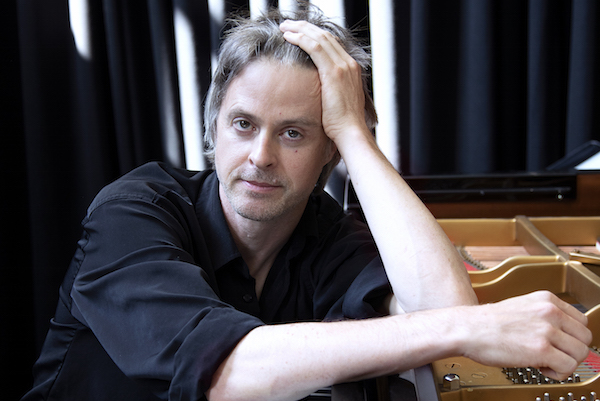
Andrew Synnott (Photo: Frances Marshall)
‘I’m interested in … seeing stories unfold’: Andrew Synnott’s New Opera to be Premiered at Wexford Festival Opera
La Cucina, a new opera by Irish composer Andrew Synnott with a libretto by Rosetta Cucchi, will be performed at Wexford Festival Opera this year.
The opera is the first work by a living Irish composer to appear on the festival’s main stage and will form part of a double bill with Rossini’s 1826 work Adina. Synnott previously had an opera, Dubliners, performed as part of the shortworks strand of the festival in 2017. Cucchi is the festival’s incoming Artistic Director.
La Cuccina and Adina, which will be conducted by Italian conductor Michele Spotti and take place on four nights between 24 October and 3 November, are thematically connected by cake of all things. La Cucina (‘The kitchen’) tells the story of a sous chef Bianca (Máire Flavin), her tyrannous head chef (Luca Nucera) and the slightly disastrous baking of a cake. Adina, the Rossini opera, which is about the wedding of the middle-aged Caliph (Daniele Antonangeli) to young Adina (Rachel Kelly), has as part of its set a huge wedding cake. Speaking to the Journal of Music, Synnott outlined the connection:
The Rossini has already been produced [last year at the Rossini Opera Festival] and the set of it is this enormous three-tier cake that becomes three surfaces for the cast of Adina… It’s a beautiful and fabulously built structure… and the idea was to connect the two productions – with La Cucina being about the baking of a cake, and then Adina being the manifestation of it on stage.
Adina was written after Rossini’s popular works The Barber of Seville and La Cenerentola but it is rarely performed. It was revived last year at the Rossini festival in Pesaro, Italy, and the same production will appear in Wexford but with a different cast.
Italian inspiration
La Cucina is Synnott’s third opera following Breakdown (2014) and Dubliners (2017). His approach to writing the new work is naturally influenced by the previous pieces, but also the main European opera canon.
I have used the same methodology more or less, which is to find within the libretto moments like arias, duets and quartets that can stand as musical focus points, and then the drama works towards those. … I take a lot of inspiration from the Italians. Puccini is a big influence, even if the music doesn’t sound particularly like Puccini. There’s a lot of what he does that inspires what I do.
For Synnott, it’s important that the music ‘follows the needs of the drama precisely – whether it’s a moment of shock, excitement, anger – that the music doesn’t undersell the emotional needs of the libretto … It’s really important to match that up.’
At the same time, the music needs to be able to carry a piece of music of any duration. [The opera] has to be properly constructed… That’s the challenge of it, because you have to be able to count in or discount ideas based on the fact that they may not do one or other of those jobs.
And then, of course, I’m finding moments of beauty or power… I [want to ] create music that I would love to put on the CD player myself … If it can stand alone as music, if it can stand up in the theatre, and create not just moments of drama but be dramatic all the way through, that’s all essential.
Conducting
As well as being a composer, Synnott works as a freelance conductor, arranger and musician. He coaches singers at the Royal Irish Academy of Music and conducts an opera for them each year, most recently Stephen McNeff’s Banished. He also conducted Irish National Opera’s The Tales of Hoffmann last autumn which featured Claudia Boyle – ‘She’s quite a special performer. Her range of skills is amazing, and the flexibility of her voice and what she can do with it, even though she’s singing several roles. The demands are enormous but she’s able to do it.’
Synnott studied music at Trinity College Dublin and was in the same year as composer Donnacha Dennehy. They formed Crash Ensemble together, with clarinetist Michael Seaver, and Synnott was co-artistic director in the early years. He is less interested, however, in the music of the New York scene which influenced Crash. He describes his own musical influences as ‘massively varied’ – ‘every piece of music I’ve ever heard has influenced me in one way or the other, either positively or negatively … My musical life is so varied. I take on so many stylistically different kinds of pieces. It’s really hard to pin it down.’
His opera Breakdown was written while he was doing a PhD in composition in DIT with Gráinne Mulvey. ‘Grainne’s and my music are like polar opposites in a way, but she’s a really brilliant supervisor. She helped me with seeing other options for orchestral colour…’. The cast for La Cucina is much smaller than Breakdown however. ‘Breakdown had 18 solo roles and an orchestra, and nobody in the world wants to take on that... It’s like shooting yourself in the foot as a composer.’
Synnott conducted the premieres of both of his earlier operas, but while he is happy to take a step back from La Cuccina, he will still be conducting at Wexford, namely Bizet’s Doctor Miracle on 23, 26 and 31 October as part of the daytime performances in the Clayton Whites Hotel. This year’s festival will also feature Massenet’s Don Quichotte and Vivaldi’s Dorilla in Tempe on the main stage, as well as the rarity of Stanford’s 1877 work The Veiled Prophet.
Synnott is particularly pleased to have soprano Máire Flavin in the lead role in La Cucina – ‘Hearing her sing is worth the ticket price alone.’ La Cucina, the composer says, is ‘something to get the mood up for Adina… it’s written very much in the Italianate style – not the style of music, but the style of presentation.’
I see myself, certainly when I am writing operas, as taking the tradition as handed down. I’m interested, particularly when I’m in the theatre, in seeing stories unfold.
Wexford Festival Opera takes place from 22 October to 3 November. La Cucina / Adina will be performed on 24, 27 and 31 October and 3 November at the National Opera House. For more, visit www.wexfordopera.com.













